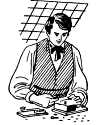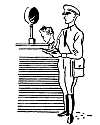 Obsessed with the idea, Morse neglected his painting, using it only as
a means of providing funds for his experiments. In a garret in lower
Manhattan he slept, ate and worked. He used the best information he
could get from Professor Henry on electromagnets.
Obsessed with the idea, Morse neglected his painting, using it only as
a means of providing funds for his experiments. In a garret in lower
Manhattan he slept, ate and worked. He used the best information he
could get from Professor Henry on electromagnets. With the help of Alfred Vail he managed to develop an instrument that would receive and record dots and dashes on paper. Later they dropped the recording and used the audible dots and dashes so well known to everyone today. For 10 years Morse tried to interest people in his electric telegraph, and it was not until 1843 that Congress finally provided the money to build a line from Washington to Baltimore. In May, 100 years ago, the first message was transmitted.  In addition to providing a new form of communication, the electric
telegraph stimulated science, industry, commerce and invention. It
opened the way to the development of the Atlantic cable, the telephone,
the radio and television.
In addition to providing a new form of communication, the electric
telegraph stimulated science, industry, commerce and invention. It
opened the way to the development of the Atlantic cable, the telephone,
the radio and television. Each of these methods of communication has or will develop a new field of its own, and each contributes to the progress of the others. The public dictates, by the way it uses them, the particular service each has to perform; engineering and management try to improve the service and reduce the cost. |








